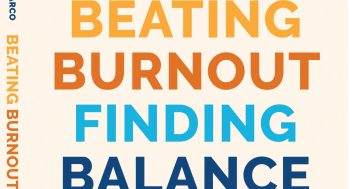With summer and the holiday break now behind us, Stephanie Nuzzo* shares tips from a career expert on finding that elusive work/life balance.
 Well, folks. We’re well into another year and somehow, it’s already feeling like things are a little too chaotic for my liking.
Well, folks. We’re well into another year and somehow, it’s already feeling like things are a little too chaotic for my liking.
If you’re back at work and you’re feeling like you need to get back on track with your approach to ‘work, life balance’, allow us to offer some tips.
To start, I think it’s important that we approach the topic of work-life balance with care.
In the end, your work is a means to an end and your life is your life.
One exists within the other, so you can’t really balance the two.
You may spend most of your waking hours at your job, but (ideally) it shouldn’t consume your world outside that time; it should contribute to that world.
However, given the ubiquity of the term ‘work/life balance,’ we’re going to stick with that here – for convenience’s sake.
If you struggle to leave work at work, SEEK’s resident career expert, Leah Lambart, has some advice.
In our chat over email, she explained that loads of Aussies are struggling with the pressures of work right now.
“New research from SEEK showed that more than one-third of Aussies entered the new year wanting to improve their overall health, wellbeing and work balance, while 20 per cent wanted to improve their work-life balance,” she shared.
She highlighted that elements like “increased workload or working longer hours”; “increased responsibilities at work”; “increased responsibilities at home”; “pressure to impress colleagues or managers” and “setting unachievable or unreasonable goals” were leading to this widely-felt need for relief.
If you’re hoping to achieve a better balance in 2023, here are some tips on how to do that.
Tips for better work-life balance
Accept that there is no ‘perfect’ work-life balance
Sounds kind of negative, but hear us out.
Lambart explained here that you’re going to have days where you feel like you have things mastered, and on other days, you might feel like you’ve dropped the ball.
That’s okay.
“Every person’s work/life balance will look different,” she said.
“…this is dependent on their family commitments, level of responsibility at work, typical working hours and other factors.
“Don’t strive for the perfect schedule; strive for a realistic one.
“Some days, you might focus more on work, while other days you might have more time and energy to pursue your hobbies or spend time with your loved ones.
“Balance is achieved over time, not each day.”
Just remember it’s always okay (it’s encouraged, in fact) to ask for help when you need it.
Set boundaries and stick to them
You’ve heard it before and we’re going to stress it to you once again.
Boundaries are everything.
This stands true at work and in your personal life, also.
Sure, sticking to boundaries with work is going to take some effort, but it is so worth it.
There are small changes you can make to your daily approach to work that can make a huge difference, Lambart shared.
“When you leave the office, avoid thinking about upcoming projects or answering company emails.
“Consider having a separate computer or phone for work, so you can shut it off when you finish for the day.
“If that isn’t possible, use separate browsers, emails or filters for your work and personal platforms,” she suggested.
She also recommended using a daily planner to physically map out your commitments for work and your personal life.
When it comes to working from home, it’s important that you separate your professional and personal worlds, too.
“…try and set clear physical boundaries in your home to help you switch between work and your personal life,” Lambart shared.
“If you leave your laptop on the kitchen table, then it is very tempting to be constantly checking emails when you should be focusing on your family or other personal commitments.
“If it is possible to set up a separate space in the house for work, then try and really remove yourself from this space at the end of the day to designate between your professional and personal life.”
Prioritise health above all else
Your health should be your number one priority, always.
No one is going to give you an award for turning up to work sick.
In fact, they’ll probably find it annoying.
And mental health should also be taken incredibly seriously.
Lambart shared that “If you struggle with your mental health and think speaking to someone would be of benefit, make use of any Employee Assistance Programs (EAP) available and discuss [your concerns] with your GP.”
“In the long run, making your health a top priority will make a positive impact on you as a person and an employee.
“Dedicating even 20 minutes in the morning to exercise before the work day begins can help you get into a routine and also ensure that your exercise plans are not getting derailed by an unexpected email or phone call,” she said.
Your personal relationships are everything
It’s easy to get swept up in the demands of a busy job, but you should always ensure you’re making time for your loved ones.
What’s the point of talking about balance if you don’t get to spend your free time with the people who matter to you?
Lambart explained you should “remember that no matter how hectic your schedule might be, you ultimately have control of your time, and your loved ones, friends, hobbies or pets should have a strong presence in your day-to-day life”.
In addition to that, she stressed the importance of making space in your world for hobbies or activities that bring you joy.
All work and no play makes Jack a dull boy, after all.
Quick ways to re-centre when it all gets a bit much
Working towards a more balanced working life is all well and good in theory, but as Lambart touched on above, there is no such thing as perfection here.
If you’re feeling a little swamped by work demands, here are some quick calming tools you can use.
- Practice meditation
- Attend a gym class
- Listen to your favourite soundtrack
- Take a long walk at lunch
- Have a quick power nap
- Have time out from technology
- Write down your remaining tasks then prioritise and set realistic goals for the day/afternoon/week
- Take a moment to have a coffee or your favourite drink
- Remember to breathe!
*Stephanie Nuzzo is the Editor of Lifehacker Australia and has been working in the media industry for close to 10 years.
This article first appeared at lifehacker.com.au











